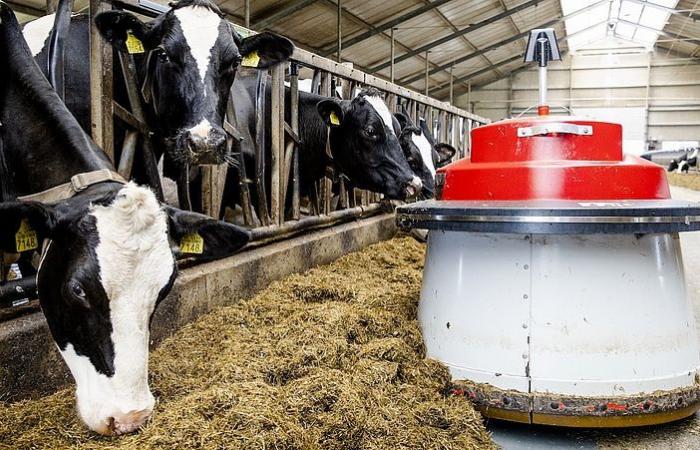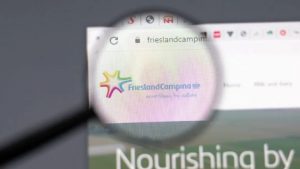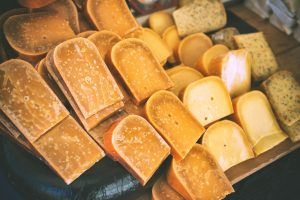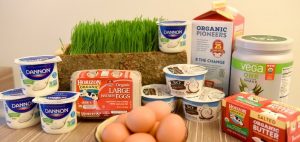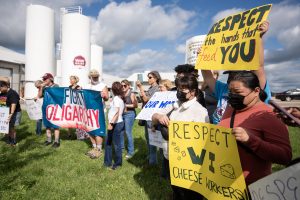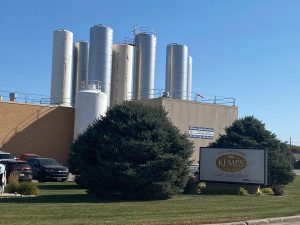
CDA MP Derk Boswijk wants Minister Piet Adema of Agriculture, Nature and Food Quality (LNV) to investigate whether mixing sustainable milk with normal dairy farmers can help them survive. “The ministry focuses too much on how farmers can stop, but the challenge lies in how we ensure that farmers can continue if they want to.”
Intervene in the market
According to Boswijk, the addition of sustainable milk can ensure that farmers earn more: “There are now quality labels and there is organic milk, but not all farmers can participate. Partly because there are too few consumers who buy those products. you have to force it, by intervening in the market.”
The processing industry, such as FrieslandCampina, would then have to purchase a certain percentage of sustainable milk from the farmers with whom they do business. “For example, 20 percent. Over time you can increase that mandatory percentage, so that the demand for sustainable and organic products automatically increases,” explains Boswijk. This is not the first time this has been suggested. The Future Searches Boer group previously advised something similar to Johan Remkes, who was then a mediator in the nitrogen dossier.
Just like biofuel
According to Boswijk, it will take some getting used to for a company like FrieslandCampina. “There will be resistance. That was also the case in the oil industry when biofuels had to be mixed with petrol, but now we don’t know any different. The processing industry ultimately has an interest in a sustainable sector.”
In the CDA’s plan, it is not the case that every carton of milk in the supermarket must consist of exactly 20 percent sustainable milk, but the processing companies must purchase a mandatory percentage of sustainable milk.
‘Milk a few cents more expensive’
According to Boswijk, farmers could get a better price for sustainable milk if use is made of the Space for Sustainability Initiatives Act. Because of this law, what the consumer pays more could end up with the farmer in its entirety, he expects.
It would mean that the milk price in the supermarket would be a few cents higher. Boswijk: “No one will lose sleep over that.” And if so? “I see a lot of people with handkerchiefs and inverted flags. That’s great, but above all we need to consume more sustainably and pay more.” In order to bring about this change in behaviour, he thinks it is necessary to make it compulsory to add sustainable milk.
Easier to comply with nitrogen guidelines
According to Boswijk, which farmers can participate if the plan goes ahead is not yet entirely clear and will have to be discussed with the sector. He is thinking of farmers who now participate in sustainable quality marks, organic farmers, but also farmers who are close to nature reserves and would like to adhere to the nitrogen targets.
Because of the certainty that the latter group of farmers will receive extra money from the industry and could get by with fewer animals, they can more easily comply with the nitrogen guidelines.
Export
An important point of criticism of the compulsory blending of sustainable milk is that a large part of the milk produced in the Netherlands is exported abroad. If that milk becomes more expensive, it will also affect our country’s export position. Is it worthwhile to intervene in the Dutch market alone?
Boswijk: “It is our responsibility to pull out all the stops so that the farmer regains perspective. We can influence what we consume ourselves.”
Majority
In any case, Boswijk’s proposal receives support from the VVD, D66, the ChristenUnie, GroenLinks and the PvdA. The parties want the minister to discuss the proposal for the addition of milk with the sector.
The ChristenUnie also puts forward the idea today during the agricultural budget. Member of Parliament Pieter Grinwis: “The ChristenUnie would like to see the promising possibility of adding milk worked out. There are still some bumps on the road: What is sustainable? How do we ensure that the processing industry really pays a good price to the farmer?” Laura Bromet of GroenLinks also supports the proposal, although she would prefer the entire sector to become sustainable, instead of a part.
‘Sympathetic, but easily realizable means’
In a reaction, FrieslandCampina says that they ‘at first sight find the proposal for the addition of milk sympathetic’. “But we believe that there are more effective and more easily achievable means to achieve the same goal and where the farmer is fairly rewarded for his sustainability efforts.”
The company refers to the extra promotion of dairy under independent quality marks, such as On the Way to PlanetProof or Scal.
